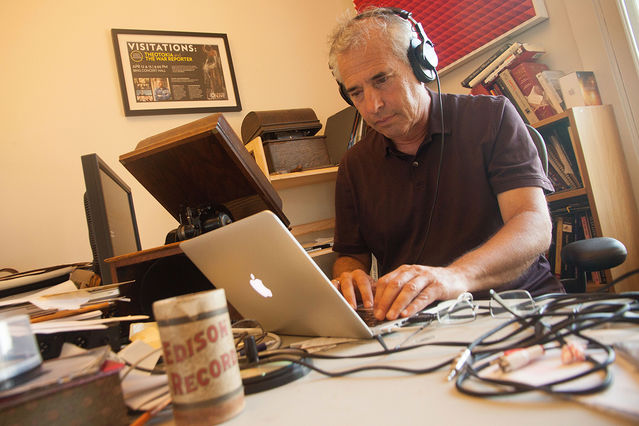The Curious Composer
Jonathan Berger grasps rare experiences and puts them to music for the rest of us.
By Matt Huston published October 9, 2019 - last reviewed on March 14, 2021

His soundscapes are mysterious, frequently unnerving, and built to seize attention. But what truly unites the operas of composer Jonathan Berger is their unremitting gaze into the minds of isolated individuals. The figure at the center of Theotokia is locked in bizarre hallucinations; Leonardo’s eponymous Renaissance man rides a runaway train of thought. In these and in much of his work, Berger opens a door into the psyches of others. As a professor of music at Stanford University, he also researches how we perceive and engage with music.
Your work paints a picture of psychic burdens. How do you approach tragedy?
I often try to see an event or a context through a particularly troubled human being. My opera My Lai is the story of the massacre of hundreds of innocent people by American soldiers during the war in Vietnam. It’s seen through the memory of Hugh Thompson, the helicopter pilot who tried to stop it, and then suffered for much of his life after that. I’m drawn to stories of ordinary people who are put into extraordinary situations as well as to internal struggle, coming to terms with situations—or failing to. I was 13 or 14 when the story of the massacre broke. I was always determined to retell that story.
What about mental illness has led you to explore it as a theme?
I spend a good deal of time visiting a relative who lives in a residence for individuals with schizophrenia. Much of that time is spent engaged with my relative’s obsessive behavior, including repetitive incantations. But in each of the residents, I encounter poignant moments of clarity, and this lucidity is often more painful than the hallucinatory worlds and obsessive routines. Music is all about repetition and creating alternate realities, so it feels natural to express the characters that we typically describe as “abnormal” or “ill” in an abstract sonic world where these arbitrary distinctions are blurred.
When your mother experienced musical hallucinations late in life, you transcribed what she relayed to you. What moved you to do that?
I was trying to make meaningful contact with someone who was barely communicative, and transcribing became a way of keeping my sanity and maintaining that connection. As my mom descended into dementia, into this horrible combination of hearing loss and cognitive impairment, she lost the memory of who my brother and I were. But other things kept popping up. She would suddenly start babbling in Yiddish; I don’t think I had ever heard her speak it before. She started talking about my father, who had died. It was a big puzzle for me. When it became clear that she was also hearing music, I thought, Let me see if I can figure out any logic to this.
Your instrumental piece Memory Slips, partly inspired by that process, evokes how sudden and vivid memory can be.
Because I’m not a scientist, I can say things that make my colleagues recoil in horror. For example, it’s not clear to me what divides “hallucination” from other terms for obsessive musical memory. Earworms, which I suffer from gravely, are, for me, hallucinatory. And auditory hallucinations in schizophrenia, as well as my mom’s musical hallucinations—these are also phenomena of memory. I think it’s useful to look at the entire body of categories and say, “These are not all that distinct from one another.”
How did you connect with Leonardo da Vinci’s way of thinking in composing your opera about him?
I delved into his notebooks and realized that what really characterized him was an unabashed, unembarrassed ability or need to ask really silly questions. The text of the opera came from the notebooks. It starts with a line in Italian—which translates to “What is a sneeze?”—and goes on from there. I became interested in the idea of this person asking childish questions that led, in a chain, to deeper and deeper thoughts. There was this path through which Leonardo arrived at an understanding of the soul that was totally out of whack with the rest of the world.
Does that kind of curiosity resonate in your own process?
Absolutely—not that I would ever draw a close analogy between what he did and what I do. But because I was a latecomer to music, nothing was intuitive to me. I learned to read music in my 20s, and many of my students read music better than I do. Today, silly questions, like what makes us tap our feet, become the groundwork of my research, which feeds into my composition in a sort of cycle.
What’s an example of how your music has fed into your research?
I’m really interested in how sound communicates information. I’ve been doing research on sonification, the mapping of data to sound. Right now a colleague and I are working with marine biologists and oceanographers on methods for musically displaying, for example, the genomics of different types of coral. The challenge is to find a language that is intuitive and meaningful. I’m using a physical model of the vocal tract to produce easily recognizable phonemes. Humans are pretty good at listening to multiple streams of speech sounds—think of choral music with independent voices—so the idea is to have the data literally sing.
Has the way you engage with music changed as technology has changed?
Yes and no. I believe in the world of slow, meticulous work and patience and slow, meticulous, deep listening. I’m not one who can listen to music in the background or while I’m driving, for the most part. We live in a noisy world, and it’s sometimes impossible to get away from music—I find that challenging.
